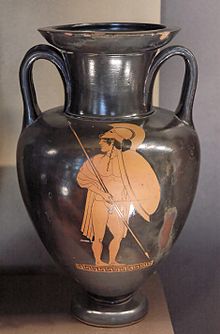InGreek mythology, Antilochus (/ænˈtɪləkəs/; Ancient Greek: Ἀντίλοχος Antílokhos) was a prince of Pylos and one of the Achaeans in the Trojan War.

Antilochus was the son of King Nestor either by Anaxibia[1]orEurydice.[2] He was the brother to Thrasymedes, Pisidice, Polycaste, Perseus, Stratichus, Aretus, Echephron and Pisistratus.
One of the suitors of Helen, Antilochus accompanied his father and his brother Thrasymedes to the Trojan War. When fighting there resumed after the aborted duel of Paris and Menelaus, Antilochus was first to kill a Trojan (namely Echepolus).[3] Antilochus was distinguished for his beauty, swiftness of foot, and skill as a charioteer. Though the youngest among the Greek princes, he commanded the Pylians in the war and performed many deeds of valour. He was a favorite of the gods and a friend of Achilles, to whom he was commissioned to announce the death of Patroclus.[4]
When his father Nestor was attacked by Memnon, Antilochus sacrificed himself to save him,[5] thus fulfilling an oracle which had warned to "beware of an Ethiopian." Antilochus' death was avenged by Achilles, who drove the Trojans back to the gates, where he is killed by Paris.[6] In later accounts, Antilochus was slain by Hector[7] or by Paris in the temple of the Thymbraean Apollo together with Achilles[8] His ashes, along with those of Achilles and Patroclus, were enshrined in a mound on the promontory of Sigeion, where the inhabitants of Ilium offered sacrifice to the dead heroes.[9][10] In the Odyssey,[11] the three friends are represented as united in the underworld and walking together in the Asphodel Meadows. However, according to Pausanias,[12] they dwell together on the island of Leuke.[4]
Among the Trojans he killed were Melanippus, Ablerus, Atymnius, Phalces, Echepolos, and Thoon, although Hyginus records that he only killed two Trojans.[13] At the funeral games of Patroclus, Antilochus finished second in the chariot race and third in the foot race.
Antilochus left behind in Messenia a son Paeon, whose descendants were among the Neleidae expelled from Messenia, by the descendants of Heracles.[14]